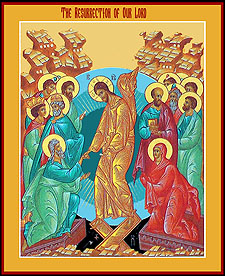✠✠✠✠✠
On Wednesday of the sixth week of Pascha, we celebrate the Leavetaking of the Feast. While most Feasts have their Leavetaking on the eighth day, Pascha, the Feast of Feasts, has its Leavetaking on the thirty-ninth day. The fortieth day is the Feast of the Lord’s Ascension, which marks the end of the Lord’s physical presence on earth. He does not abandon us, however. He has promised to be with us always, even until the end of the age (MT 20:28). As we sing in the Kontakion for Ascension, “Thou didst ascend in glory, O Christ our God, not being parted from those who love Thee, but remaining with them and crying: I am with you and no one will be against you.” There is a similar thought expressed in the Troparion for the Dormition: “In falling asleep, you did not forsake the world, O Theotokos.”
The services today are celebrated just as on the day of Pascha itself. The daily readings from Holy Scripture, of course, will differ. After the Dismissal at Liturgy, the paschal hymns are no longer sung. The prayer “O Heavenly King” is not said or sung until Pentecost.The Winding Sheet (Plaschanitsa) is taken from the altar and is put in its proper place. Even though today is a Wednesday, fish, wine, and oil are permitted.
✠✠✠✠✠
Saint Niketas (Nikḗtas), Bishop of Chalcedon, lived during the second half of the eighth century. For his God-pleasing life, he was consecrated as Bishop of Chalcedon.
Saint Niketas distinguished himself by his charity; he always helped the poor, he lodged travellers in his home, he cared for orphans and widows, and he interceded for those who had been wronged.
During the reign of the iconoclast Leo the Armenian (813-820), Saint Niketas bravely denounced the Iconoclast heresy and urged his flock to venerate the holy icons of Christ, the Theotokos, and the saints. Saint Niketas endured much suffering from the impious emperor and his like-minded cohorts. He was subjected to tortures and sent off to exile.
The holy confessor Niketas died at the beginning of the ninth century. From his relics occurred many miracles of healing. The Canon of the service, written by the priest Joseph of Constantinople, also includes Saint Niketas’s brother, Saint Ignatius, among the saints.
In truth you were revealed to your flock as a rule of faith, / an image of humility and a teacher of abstinence; / your humility exalted you; your poverty enriched you. / Hierarch Father Nicetas, / entreat Christ our God that our souls may be saved.
Kontakion — Tone 8
You shone with the splendour of your deeds, venerable Nicetas. / You became an heir to the throne of the apostles. / Completely filled, O Father, with the teachings of God, you shone like the sun upon your flock. / Therefore, we cry out to you: “Rejoice, beauty of Chalcedon.”


No comments:
Post a Comment
Comments are subject to deletion if they are not germane. I have no problem with a bit of colourful language, but blasphemy or depraved profanity will not be allowed. Attacks on the Catholic Faith will not be tolerated. Comments will be deleted that are republican (Yanks! Note the lower case 'r'!), attacks on the legitimacy of Pope Leo XIV as the Vicar of Christ, the legitimacy of the House of Windsor or of the claims of the Elder Line of the House of France, or attacks on the legitimacy of any of the currently ruling Houses of Europe.